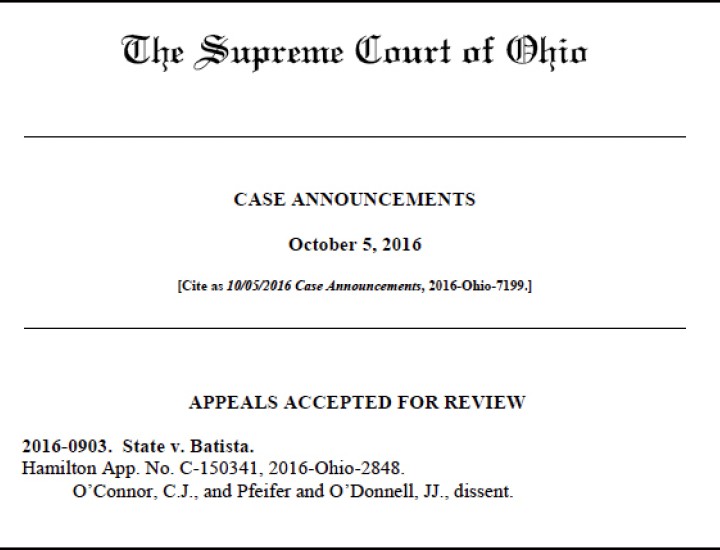Published January, 2017
State of Ohio v. Orlando Batista, Amici Curiae Brief, Supreme Court of Ohio (2016)
In October 2016, the Supreme Court of Ohio announced it would review the HIV criminal law at issue in State of Ohio v. Orlando Batista. In July 2014, Orlando Batista was indicted for felonious assault for allegedly engaging in sexual conduct with his girlfriend without first disclosing his HIV status to her. The trial court found him guilty and sentenced him to 8 years imprisonment, the maximum allowed under the statute. Batista preserved his right to challenge the legality of the Ohio statute itself on appeal, but the appellate court rejected these arguments and affirmed Batista's conviction. The Hamilton County Public Defender, representing Batista, submitted a brief to the Supreme Court of Ohio seeking review of the Ohio law. In June 2016, CHLP and the ACLU of Ohio Foundation, along with thirteen Ohio-based and national HIV, civil liberties, LGBT, social advocacy and criminal justice organizations, submitted a memorandum in support of Mr. Batista’s request for review.
In December 2016, CHLP, with support from the Ohio Public Defender and Gibbons P.C. law firm, along with seven Ohio-based and national HIV, LGBT, health professional and criminal justice organizations, submitted an amici curiae brief in support of Orlando Batista to the Supreme Court of Ohio arguing the state's felonious assault statute: (1) violates the Equal Protection Clauses of the Ohio and United States Constitutions because it singles out people living with HIV for prosecution in response to conduct that is not criminal in the case of other groups, for example those living with other sexually transmitted diseases and (2) violates the clear prohibitions against disability-based discrimination under the Americans with Disabilities Act and Section 504 of the Rehabilitation Act.
Jeffrey Gamso, the former Legal Director of the ACLU of Ohio Foundation, along with the ACLU of Ohio Foundation and the Center for Constitutional Rights, submitted an additional amici curiae brief supporting Mr. Batista arguing that Ohio's felonious assault statute compels speech in violation of the Free Speech Clauses of the First Amendment and the Ohio Constitution.
Copyright Information: CHLP encourages the broad use and sharing of resources. Please credit CHLP when using these materials or their content. and do not alter, adapt or present as your work without prior permission from CHLP.
Legal Disclaimer: CHLP makes an effort to ensure legal information is correct and current, but the law is regularly changing, and the accuracy of the information provided cannot be guaranteed. The legal information in a given resource may not be applicable to all situations and is not—and should not be relied upon—as a substitute for legal advice.
